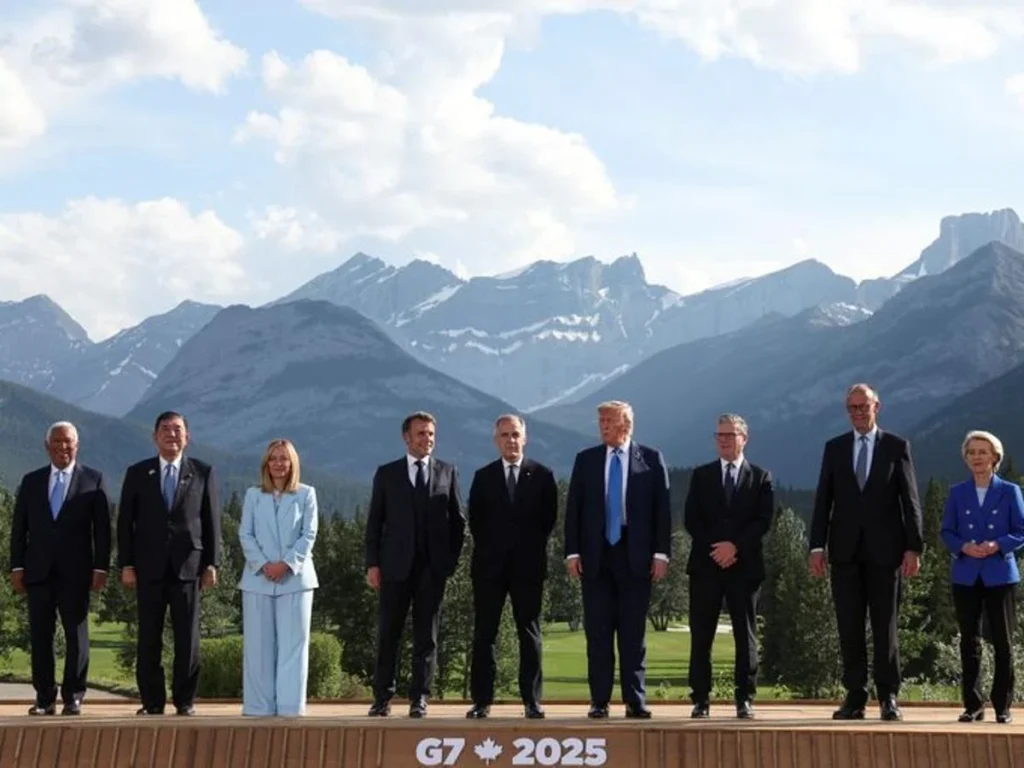KANANASKIS, Canada — As airstrikes between Israel and Iran threaten to plunge the Middle East into deeper chaos, leaders of the Group of Seven (G7) nations issued a forceful joint statement late Monday expressing unequivocal support for Israel and branding Iran as the “principal source of regional instability and terror.”

The statement, which came amid high-level talks in Canada’s Rocky Mountains, reflects the G7’s growing alarm over the spiraling violence that began Friday when Israel launched a preemptive strike on Iranian military sites, saying the move was necessary to thwart Tehran’s nuclear ambitions.
“We affirm that Israel has a right to defend itself. We reiterate our support for the security of Israel,” the G7 leaders said, while also warning, “Iran can never have a nuclear weapon.”
The conflict marks a dangerous escalation in a region already convulsed by nearly nine months of war in Gaza, where Israel’s military campaign has killed tens of thousands and displaced many more. Iran, which denies any nuclear weapons ambitions and claims its atomic program is for peaceful purposes, has vowed retaliation while accusing Israel of war crimes.
According to Iranian officials, more than 220 people—mostly civilians—have been killed in the strikes so far. Israel, meanwhile, reported 24 civilian deaths following Iranian missile retaliation.
As tensions soared, President Donald Trump announced he would leave the G7 summit early to return to Washington and monitor developments more closely. White House Press Secretary Karoline Leavitt confirmed that Trump would depart after a working dinner with fellow leaders.
The White House has denied direct U.S. involvement in Israel’s strikes but acknowledged that Washington had prior knowledge of the operation. Trump praised the strikes as “excellent” and urged Tehran to avoid targeting American personnel or facilities in the region.
In a dramatic post on social media, Trump issued an ominous warning: “Everyone should immediately evacuate Tehran.” Meanwhile, a new Israeli airstrike on Monday hit Iran’s state broadcaster, prompting further concerns about escalation and the targeting of civilian infrastructure.
Despite the strong support for Israel, the G7 statement also emphasized the need for restraint and broader diplomatic efforts, saying:
“We urge that the resolution of the Iranian crisis leads to a broader de-escalation of hostilities in the Middle East, including a ceasefire in Gaza.”
G7 leaders—representing the U.S., Canada, the UK, France, Germany, Italy, and Japan, along with the European Union—said they were prepared to coordinate efforts to stabilize global energy markets, which have already shown signs of volatility in response to the Israel-Iran crisis.
U.S. Secretary of State Marco Rubio also held a series of urgent phone calls with counterparts in the UK, France, and the EU, discussing the potential for coordinated diplomacy and sanctions in response to Iran’s actions. Despite the hostile rhetoric, Washington reiterated that a nuclear deal with Iran remains a long-term goal.
Iran, a signatory to the Nuclear Non-Proliferation Treaty (NPT), maintains it has the right to enrich uranium for peaceful energy purposes. Israel, which has never signed the treaty and is widely believed to possess a nuclear arsenal, neither confirms nor denies its nuclear capabilities.
The deep mistrust between the two regional powers has stymied diplomatic solutions, and the latest round of violence threatens to undo years of nuclear diplomacy. The G7’s declaration that Iran must never be allowed to obtain nuclear weapons underscores the bloc’s long-standing strategic alignment with Israel on the issue.
As the world watches the Middle East teeter on the edge of full-scale war, the G7’s unified stance signals that Western powers remain firmly behind Israel, while intensifying pressure on Iran—a dynamic that may shape not just the outcome of the current crisis, but the broader security landscape for years to come.



